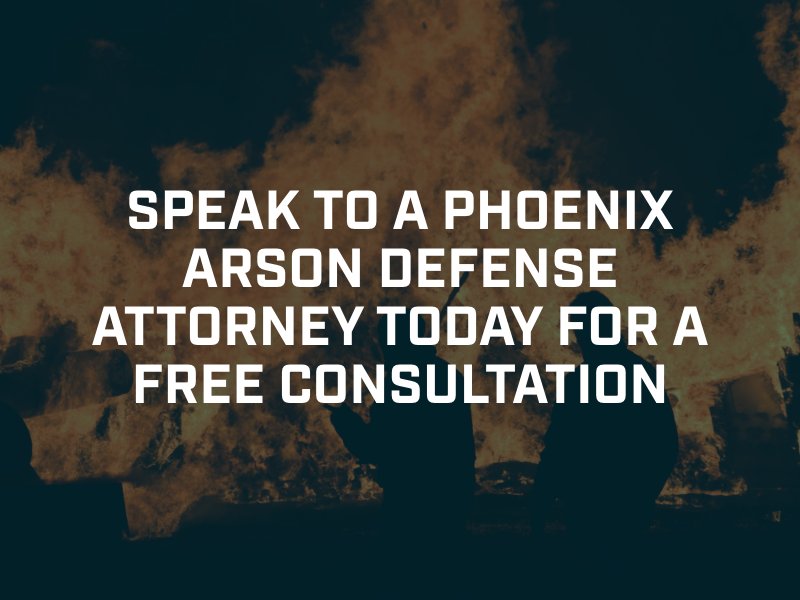
Under Arizona law, knowingly and unlawfully damaging a structure or property by causing a fire or an explosion is arson. However, the nature of the property that is damaged makes a world of difference. If you were charged with arson in Arizona, speak with a Phoenix arson defense lawyer to learn how to protect your legal rights.
To immediately access the resources at any point on this page, click the corresponding link below.
Why Hire the AZ Defenders?
Arson of a Structure or Property
Arson of an Occupied Structure
Reckless Burning
Burning of Wildlands
Defenses to Arizona Arson Charges
Speak to a Defense Attorney Today

Arizona Revised Statutes § 13-1703 classifies arson of a structure as a Class 4 felony. Arson of property is a Class 4 felony is the property had a value of more than one thousand dollars, a Class 5 felony if the property had a value of more than one hundred dollars but not more than one thousand dollars, and a Class 1 misdemeanor if the property had a value of one hundred dollars or less.
A Class 4 felony is punishable by 1 year to 3.75 years imprisonment, up to 4 years of probation, and a maximum fine of $150,000.
A Class 5 felony is punishable by 6 months to 2.5 years imprisonment, up to 3 years of probation, and a maximum fine of $150,000.
Prior felony convictions can lead to increased punishment and mandatory prison sentences. Moreover, a felony conviction leads to a loss of civil rights, including the right to bear arms.
A Class 1 misdemeanor carries a maximum fine of $2,500, up to 3 years of probation, and up to 6 months in jail.
Neither felonies or misdemeanors can be removed from your record and a conviction can lead to serious collateral consequences like loss of employment, housing, loans opportunities, and licensure. Learn more by reaching out to a Phoenix criminal defense attorney experienced with defending against arson charges.
An occupied structure is any building, object, vehicle, watercraft, aircraft, or place with sides and a floor, used for lodging, business, transportation, recreation, or storage in which one or more people is or is likely to be present or so near as to be in equivalent danger when a fire or explosion occurs. Any dwelling house is considered an occupied structure, regardless of whether it is occupied, unoccupied, or vacant.
Arson of an occupied structure is a far more serious offense than arson of a non-occupied structure or property. If convicted of arson of an occupied structure, pursuant to Arizona Revised Statutes § 13-1703, you face a Class 2 felony.
A Class 2 felony carries a prison term of 3 to 12.5 years, up to 7 years of probation, and a maximum fine of $150,000. Prior felony convictions can increase the sentencing range and make you ineligible for probation so contacting a skilled Phoenix arson lawyer as soon as possible following arson charges is imperative.
The definition of reckless burning under Arizona Revised Statutes § 13-1702 is to recklessly cause a fire or explosion that results in damage to an occupied structure, unoccupied structure, wildland or property. “Reckless” in Arizona law means that a person is aware of and consciously disregards a substantial and unjustifiable risk that the result will occur.
Recklessness is a gross deviation from the standard of conduct that a reasonable and prudent person would abide by in similar circumstances. An individual does not have to have intended to start a fire to be found guilty of reckless burning. If his or her reckless or wanton actions are to blame for the fire or explosion, he or she could face reckless burning charges.
Reckless burning is a less serious offense than arson or arson of an occupied structure. However, it can still come with substantial penalties. The crime of reckless burning in Arizona is a Class 1 misdemeanor. Since the defendant did not mean to start the fire or cause the explosion, the penalties associated with reckless burning are decreased compared to arson. The punishments for reckless burning may include up to six months in jail and $2,500 in fines.
Arizona is home to beautiful wildlands, or protected areas of wildlife and native habitats. Part of the measures in place to protect these wildlands are laws against fires in these areas or any unauthorized burning. Arizona Revised Statutes § 13-1706 states that it is unlawful for any person to intentionally, knowingly, recklessly or with criminal negligence set fire to or cause to be set on fire any wildland without lawful authority.
Under Arizona Revised Statutes § 13-1701, “wildland” means any brush-covered land, cutover land, forest, grassland or woods. According to state law, it is illegal to set fire to any wildland, whether an individual meant to cause the fire or not. There is an exception, however, if the person owns the wildland. Yet it is against the law to permit a fire that was set by the person to pass from his or her own land to the land of another person.
Other exceptions to the law against the burning of wildlands are open burns that are lawfully conducted for agricultural operations, fire management operations conducted by a political subdivision, prescribed or controlled burns conducted with written authority from the state forester, lawful activities conducted in accordance with any rule adopted by a government authority, and a fire started for the purpose of cooking or warming that does not spread from its source and does not go against a fire ban or burn restriction.
Arizona ardently protects its wildlands and punishes those who cause damage to these protected areas harshly. This includes those who cause wildfires. Being found guilty of the offense of burning wildlands can result in one of the following charges, depending on the circumstances of the alleged crime:
The penalties for burning wildlands or starting a wildfire in Arizona depend on the intent of the defendant. If the individual did not mean to start the fire, he or she may face fines and probation (although jail time is possible). If intent to start a fire is proven, the felony charge will most likely come with jail time or a probation plea agreement if the defendant has a clean criminal record. If someone was harmed or could have been harmed by the fire, the penalties will increase.
It is critical not to underestimate the effect that arson charges could have on your life and future. An arson conviction could take away your freedom, rights and certain civil liberties. If you are convicted of a felony, for example, this could affect your ability to find housing and a job after you complete your sentence. It is important to hire a lawyer to help you build the strongest possible defense against arson charges.
Common defenses to arson cases can include:
In some scenarios, it may be possible to negotiate arson charges down to a lesser crime, such as reckless burning, to avoid the most serious penalties. At AZ Defenders, our criminal defense attorneys can provide top-level legal protection during interviews with law enforcement officers or investigators from the very beginning of your arson case.
We will conduct an in-depth review of the case against you to identify weaknesses in the prosecutor’s case that we can exploit for your defense. Then, we will use our access to forensic investigators and other professionals to present strong evidence. Our arson and criminal damage attorney in Phoenix will treat your case with the attention that it deserves while showing you respect and compassion as our client.
If you are facing an arson charge in Arizona, whether of an occupied structure or of an unoccupied structure or property, you face serious legal ramifications. Don’t face prison time, fines, loss of liberty, and more on your own. The Phoenix arson lawyers at AZ Defenders have decades of experience in defending those charged with serious crimes. Call today at 480-456-6400 or contact us online for a free consultation so we can determine what the best course of defense is for your individual case.